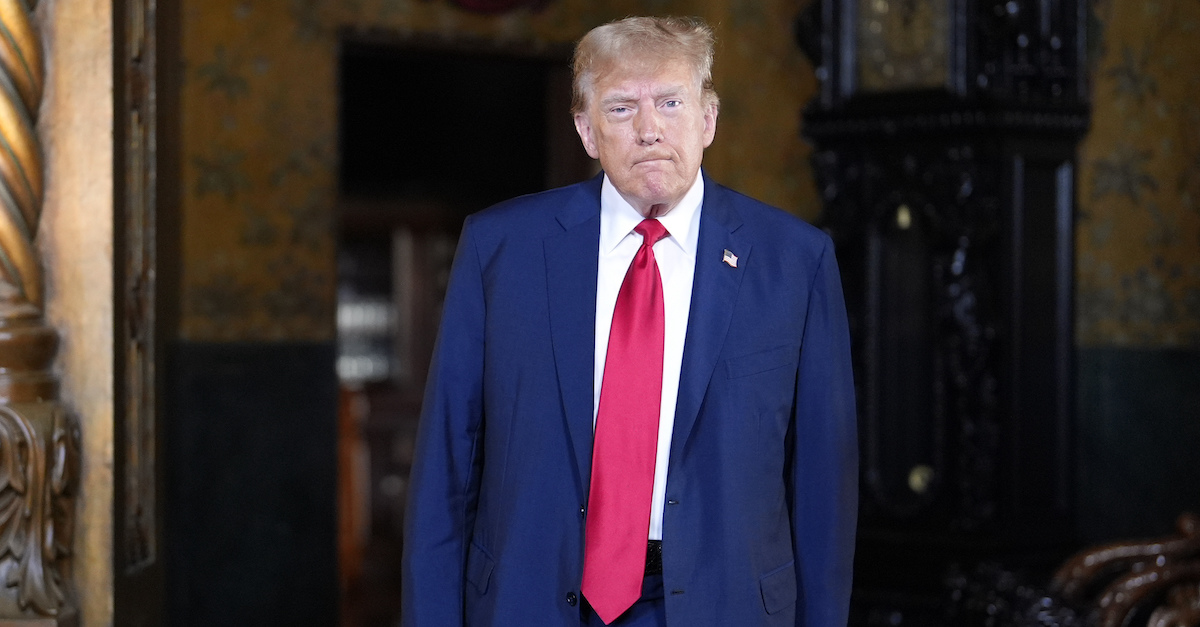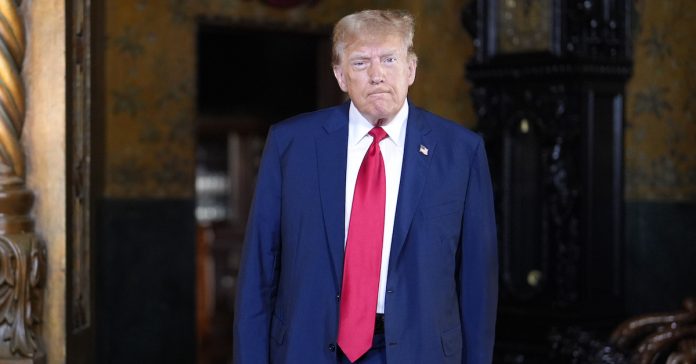
Republican presidential candidate former President Donald Trump arrives to speak at his Mar-a-Lago estate, Monday, March 4, 2024, in Palm Beach, Fla. (AP Photo/Rebecca Blackwell)
Former president Donald Trump cannot come up with the cash to stave off his civil fraud liabilities in New York State while he appeals the judgment, according to a gargantuan Monday morning court filing.
Spread across 4,919 total pages including exhibits, the document is stylized as a reply in further support of a stay pending appeal.
The filing asks an Empire State appeals court to block New York Attorney General Letitia James from collecting on the over $464 million judgment, inclusive of interest, owed by the 45th president and several co-defendants, including the various business that make up the Trump Organization, former executives, and his two adult sons.
Absent some intervention by New York state appellate courts, the attorney general’s office can execute the judgment on March 25.
Trump and the other defendants are planning to appeal the judgment — likely at a basic level and in terms of the amount owed. Typically, a defendant in such a position would seek a bond from a private company to secure the amount while appeals are pursued in higher courts. But, the defendants say, they have had no luck coming to an agreement with a bond company — because the amount they collectively owe is just too large.
“The amount of the judgment, with interest, exceeds $464 million, and very few bonding companies will consider a bond of anything approaching that magnitude,” the filing reads. “The practical impossibility of obtaining a bond interferes with Defendants’ right to appeal and threatens this Court’s appellate jurisdiction.”
Trump’s attorneys say they have it on good advice that a “bond requirement of this enormous magnitude” would effectively require “case reserves approaching $1 billion” and complain that such a request would be “unprecedented for a private company.”
To bolster their argument, one of the defendants’ dozens of exhibits is an affidavit from insurance brokerage executive Gary Giulietti, who previously testified during the civil fraud trial.
“Despite scouring the market, we have been unsuccessful in our effort to obtain a bond for the Judgment Amount for Defendants for the simple reason that obtaining an appeal bond for $464 million is a practical impossibility under the circumstances presented,” the broker’s affidavit reads. “Over the course of my career, during which I have been directly or indirectly involved in the issuance of thousands of bonds, I have never heard of nor seen an appeal bond of this size for a private company or individual.”
Efforts to secure such a bond for the defendants, Giulietti said, had been going on before the judgment in the case was issued, continued up until March 15, and involved reaching out “to virtually every major surety in the market and spending countless hours negotiating with one of the largest insurance companies in the world.”
Still, the broker and the defendants say, the effort proved fruitless because any of the very few companies who might have been willing to put up such a bond would have only done so with cash being put up as collateral — instead of, for example, real estate.
Trump has substantial real estate holdings in multiple states and some of those holdings were, in fact, offered up. Underwriting companies, however, cannot accept real estate for various logistical reasons.
“While it is my understanding that the Trump Organization is in a strong liquidity position, it does not have $1 billion in cash or cash equivalents,” Giulietti goes on. “As a result, for a company such as The Trump Organization, which has most of its assets invested in real estate, obtaining a bond for $464 million is a practical impossibility.”
Trump’s attorneys are asking the appeals court to immediately stay all aspects of the trial court’s order. In the event the stay is not immediately granted, the defendants are requesting oral argument on the issue. And, if the appeals court outright denies the requested stay, Trump wants to immediately appeal to the highest court in the state — with a temporary stay in place while that effort plays out.
In the long-running and far-reaching fraud case, several defendants — including numerous Trump-affiliated companies — were found liable on multiple counts on summary judgment in September 2023.
A bench trial — that is, a trial without a jury — on the extent of liability was held between October and December 2023. In February, New York Supreme Court Justice Arthur Engoron arrived at a penalty just shy of the $370 million the state had asked for in January.
Trump’s Monday filing offers a preview of the appeals arguments likely to unfold in the near future.
From the filing, at length:
Supreme Court imposed a massive disgorgement award in the absence of any evidence that the alleged misrepresentations caused the supposedly ill-gotten proceeds, in violation of the black-letter requirement that the disgorged amount must be causally connected to the violation. Supreme Court double- and triple-counted damages, and committed elementary errors in the process, such as conflating the proceeds of a sale with the profits from that sale Such basic mistakes would have been prevented if this case had been allowed to be adjudicated in the Commercial Division, where it belonged. These errors establish that the disgorgement award is unconstitutional. It is “grossly disproportional” in violation of the Excessive Fines Clause of the United States Constitution and a parallel clause of the New York Constitution, as well as basic principles of due process and selective prosecution.
“Because the judgment is unconstitutionally excessive, the bond requirement violates the Eighth Amendment as well, because it imposes an irrational, punitive sanction,” Trump’s filing continues. “This case has no victims, no damages, and no actual financial losses.”
Have a tip we should know? [email protected]

